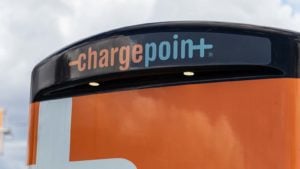Building out a charging infrastructure is critical as governments across the world push to make electric vehicles (EVs) the alternative and in fact, the replacement for internal combustion engine (ICE) vehicles. That’s why many investors are looking at EV charging stocks to buy.
According to the International Energy Agency, private chargers outnumber public chargers by nearly 10 to 1. However, public charging is still a key to overcoming range anxiety that is one reason preventing widespread EV adoption as well as equitable access to EVs.
This means the EV charging sector still has plenty of room to grow. And, there are several publicly traded companies for investors to consider. For some investors, Tesla (NASDAQ:TSLA) will be the choice. It certainly fits the category of stocks to potentially buy on a dip. And the company’s charging connector is the standard in North America.
However, if you’re looking for more undervalued EV charging stocks to buy that also have a lower stock price, consider these three names.
Beam Global (BEEM)
Source: shutterstock.com/JLStock
Beam Global (NASDAQ:BEEM) could make a list of EV charging stocks to buy based on its recent earnings reports. The company has been posting year-over-year (YOY) revenue growth for some time. However, in the last two quarters, it started to deliver YOY growth in regard to earnings per share (EPS).
The company is not yet profitable, but it’s getting closer. And a recent contract win may be the catalyst that ensures the stock achieves that milestone. The contract comes from the Federal Railroad Administration which ordered Beam Global’s EV ARC solar-powered EV charging systems. This is an off-grid solution that generates and stores its own clean electricity.
Beam Global is a tiny company with a market cap of $84.4 million. One concern that investors frequently have about investing in small-cap companies at a time of higher (or more normalized) interest rates is debt that may have to be refinanced. However, Beam remains debt-free which adds more credibility to the idea that the company may soon become profitable.
ChargePoint (CHPT)

Source: JL IMAGES / Shutterstock.com
EV charging stocks have been beaten up and none more than ChargePoint (NYSE:CHPT). The stock is down over 77% in the last 12 months and is down 24% in 2024. However, CHPT stock is up 30% in the month ending May 20, 2024, and it could be just the beginning.
Analysts and investors soured on ChargePoint because revenue is declining YOY. That’s worrisome for a company that is not yet profitable.
However, being a leader in the sector has its advantages. ChargePoint is starting to see an increase in annual subscription sales. That is likely to give the company’s revenue a high floor. Combine that with a debt profile that features no debt maturities until 2028 and $150 million in undrawn revolving credit, and the stock becomes even more attractive.
And then there’s this. At first glance, the consensus hold rating on CHPT stock doesn’t inspire much confidence. But look a little deeper and you’ll see that six out of 20 analysts give the stock a strong buy rating to contrast with just one strong sell rating.
Wallbox (WBX)

Source: shutterstock.com/Nixx Photography
Last, but not least, is Wallbox (NYSE:WBX). This is a small-cap company with a market cap of just over $242 million.
The Barcelona-based company offers “a complete portfolio of charging and energy management solutions for residential, business and public use.” The company’s goal is to move beyond EV charging to address areas such as vehicle-to-home, vehicle-to-grid, energy storage and energy trading all from a wall-mounted box (hence the company’s name).
In December 2023, Generac (NYSE:GNRC) took a minority stake in Wallbox. The company, which is known for its stand-alone home generators, will now offer its customers Wallbox’s full suite of EV charging solutions.
Wallbox posted revenue of $46.7 million (43.1 million euros) for the quarter ending March 31, 2024. That was a 23% YOY increase. The company is not yet profitable, but it expects to be close to adjusted EBITDA break-even by the second quarter.
In addition, Wallbox’s balance sheet looks solid. For the quarter ending March 31, 2024, WBX had $104.16 million (96 million euros) in long-term debt. However, the company also ended the quarter with 90.3 million (83.3 million euros) of cash, cash equivalents and financial investments.
On the date of publication, Chris Markoch did not have (either directly or indirectly) any positions in the securities mentioned in this article. The opinions expressed in this article are those of the writer, subject to the InvestorPlace.com Publishing Guidelines.










